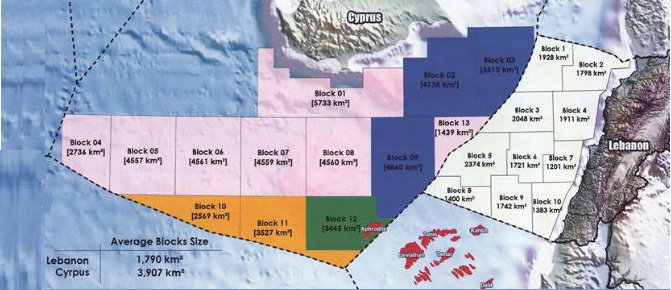Lebanon and Israel are two countries in a state of war. Yet an interesting signal came in early October. The two have given their agreement to start negotiations with the assistance of the United States and the United Nations to define maritime borders. The announcement of this deal was made simultaneously by Jerusalem, Beirut and Washington and came shortly after Bahrain and the United Arab Emirates became the first Arab nations to establish relations with Israel after Egypt in 1979 and the Jordan in 1994.
The opening session of the negotiations took place in mid-October and was hosted at the UNIFIL headquarters in the village of Naqoura. The Lebanese side did not agree to sit at the same table with the Israelis (who have occupied the Cedar land several times). In fact, there have been various controversies in Lebanon. Even Prime Minister Hassan Diab said President Aoun’s appointment of delegation members without consulting him was in violation of the constitution. So everything took place through US mediation.
The opening session was chaired by the US State Department’s senior official for the region, David Schenker, while the mediator of the talks was John Desrocher, the former US ambassador to Algeria. Israel sent a team of six members, including the director general of its energy ministry, Prime Minister’s foreign policy adviser and the head of the army’s strategic division. The four-members of the Lebanese delegation included two army officers, a Lebanese oil officer and a maritime border law expert. Even if someone on the Israeli side has dared to speak of a first step towards normalization, in reality we are not at that point. The negotiation concerns only the maritime border. The dispute concerns 860 square km in the Mediterranean Sea, known as Zone No. 9, which is rich in oil and gas. Both Israel and Lebanon claim to belong to their exclusive economic zone. Israel has placed buoys as a de facto border, but not effectively recognized by Lebanon or the United Nations. The pressure to resolve the dispute has increased as Israel and Cyprus have begun exploiting offshore gas in the eastern Mediterranean. Once an agreement is reached, both Lebanon and Israel could start the exploitation of gas fields in the area.

But why now?
For the United States, the interest of this agreement is clear. It helps make the Abrahamic Agreements seem more robust and initiates a stabilization of the Israeli-Lebanese dossier. That it is so important to the US is demonstrated by the statement of the US Secretary of State Mike Pompeo who speaks of another “historic agreement” that “will offer the potential for greater stability, security and prosperity for the citizens of both nations”.
For Israel, the interests are different. By resolving the dispute Israel removes a motive from Hezbollah’s hands to ignite the fuse of war and at the same time attack its own drilling rigs already at work. Israel operates two natural gas fields in the Mediterranean: Tamar and Leviathan. Israel also signed export agreements with Egypt and Jordan and in January with Cyprus and Greece to link offshore gas reserves to Europe. But the waters of the eastern Mediterranean touch the Levant, where we now have the Greek-Turkish conflict. The gas reservoirs in that area cannot be exploited without an agreement with Lebanon. Not to mention the fact that offering the Lebanese a chance for a beneficial agreement with Israel would take the ground away from the entire Hezbollah propaganda machine.
For Lebanon, the negotiations take place at a particular moment. An economy in collapse, a lira devalued to 80%, a public debt of 170% among the highest in the world, a sectarian political system in deep crisis unable to respond to the demands of its people, but also stubborn and arrogant in remaining attacked to power even after the devastating explosion of the port. Always looking at the political situation, the designated premier, Mustafa Adib, renounced his post for “a mission government” received a few weeks ago precisely because of Nabih Berry (head of the Amal movement) and Hezbollah who wanted the two finance and economy ministries for themselves at all costs. Necessary for two reasons: not to highlight all the transactions in favor of the Shiite parties by these two departments in the past, but also because the international funds that will help the country after any reforms will pass through them. So why did the two decidedly more anti-American and anti-Israeli Shiite political parties, despite public criticism and opposition, accept these negotiations? On the one hand to prove reliable in the eyes of the international community (necessary even after the move by the United States to impose sanctions on an important aide of Nabih Berri) and on the other in the face of internal opinion. Perhaps they are partly trying to prevent the US from imposing further sanctions on Lebanese figures and buying time until after the US elections. But in a dire economic situation, a maritime border agreement would facilitate the search for oil and gas in Lebanese territorial waters and their potential exploitation, which could provide the country with much needed income. They understood that on something they had to give up, and they chose the most pragmatic tool.
Other actors are interested in these negotiations and should not be underestimated. In 2018, Lebanon granted a license to carry out offshore explorations in two blocks, including the disputed block no. 9, to a consortium of three international companies: to the French Total, which is also the leader, to the Italian Eni and to the Russian Novatek.
Clearly resolving the dispute would be important for the parties involved both from a strategic point of view, but also from an economic point of view. And on the latter Lebanon has greater interest. It would be a mistake to Lebanon’s disadvantage if by chance this was just a tactic awaiting what will happen with the American elections and with the economic help from the Monetary Fund.
Author
-

Researcher on International Relations Middle East and Balkans
View all posts
CSSII- Centro Interdipartimentale di Studi Strategici, Internazionali e Imprenditoriali,
Università di Firenze, Italy, Albania




